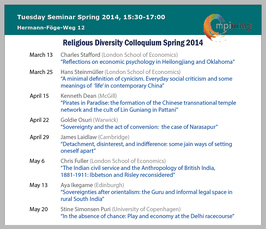"Sovereignty and the act of conversion: the case of Narasapur"
Religious Diversity Colloquium Spring 2014
- Datum: 22.04.2014
- Uhrzeit: 15:30 - 17:00
- Vortragende: Goldie Osuri (University of Warwick)
- Dr. Goldie Osuri is Assistant Professor at the Department of Sociology. She holds a PhD from the University of Massachusetts at Amherst, USA. Prior to her appointment at Warwick, she worked at Macquarie University, Sydney, Australia. She has recently published a monograph, Religious Freedom in India: Sovereignty and (Anti) Conversion (Routledge, 2013).
- Ort: MPI-MMG, Hermann-Föge-Weg 12, Göttingen
- Raum: Conference Room

For more details please contact vdvoffice(at)mmg.mpg.de.
In Religious Freedom in India: Sovereignty and (Anti) Conversion (2013), Dr. Osuri has argued that a study of the politics of anti-conversion has to take account of the conceptual implications of sovereignty and its entangled history with constructions of the religious and the secular. The focus on the quest for sovereignty highlights how conversion is deemed either as an exception to the norm of a Hindu nation or as a suspect anti-national activity that needs to be subject to surveillance and regulation (registering and demonstrating a genuine intent to convert) through Hindu nationalist anti-conversion laws.
A counter to the oppressive effects of the mechanisms of sovereignty, however, can be discerned in Agamben‘s (2007) discussion of profanation. Goldie focusses on family stories of conversion in the town of Narasapur, Andhra Pradesh, as a way to think through the sanctities of secularism and the possibilities of the profane. The concept of profanation, she argues, offers one way to think about the affective and experiential ways in which conversion functions.